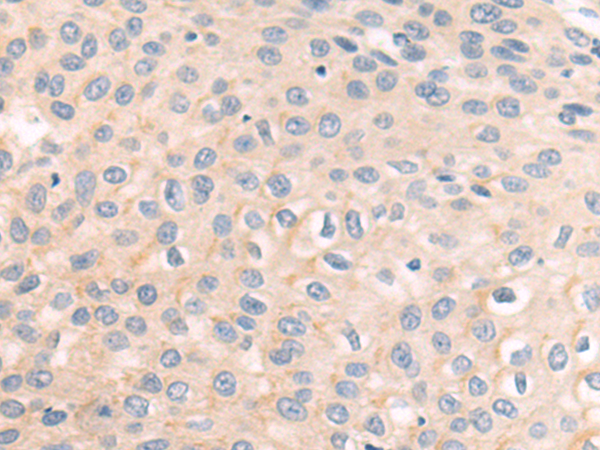
| WB | 咨询技术 | Human,Mouse,Rat |
| IF | 咨询技术 | Human,Mouse,Rat |
| IHC | 1/100-1/300 | Human,Mouse,Rat |
| ICC | 技术咨询 | Human,Mouse,Rat |
| FCM | 咨询技术 | Human,Mouse,Rat |
| Elisa | 1/5000-1/10000 | Human,Mouse,Rat |
| Aliases | AT; ATK; BPK; XLA; IMD1; AGMX1; IGHD3; PSCTK1 |
| Host/Isotype | Rabbit IgG |
| Antibody Type | Primary antibody |
| Storage | Store at 4°C short term. Aliquot and store at -20°C long term. Avoid freeze/thaw cycles. |
| Species Reactivity | Human, Mouse |
| Immunogen | Fusion protein of human BTK |
| Formulation | Purified antibody in PBS with 0.05% sodium azide and 50% glycerol. |
+ +
以下是关于BTK抗体的3篇代表性文献摘要概览:
1. **《BTK signaling in B cell development and function》**
- 作者:Funda, D.P. 等
- 摘要:探讨BTK在B细胞受体(BCR)信号通路中的核心作用,解析其如何调控B细胞分化、增殖及抗体产生,并涉及BTK基因突变导致免疫缺陷(如XLA)的分子机制。
2. **《Targeting BTK with Ibrutinib in Relapsed Chronic Lymphocytic Leukemia》**
- 作者:Byrd, J.C. 等
- 摘要:临床研究证实BTK抑制剂伊布替尼在复发性慢性淋巴细胞白血病(CLL)中的显著疗效,通过阻断BCR信号通路抑制肿瘤细胞存活,延长患者无进展生存期。
3. **《The Bruton’s tyrosine kinase (BTK) inhibitor acalabrutinib demonstrates potent anti-tumor activity in B-cell malignancies》**
- 作者:Honigberg, L.A. 等
- 摘要:介绍第二代BTK抑制剂阿卡替尼的临床前研究,显示其对B细胞淋巴瘤的高选择性抑制能力及减少脱靶效应的优势,为耐药患者提供新选择。
4. **《Resistance mechanisms to BTK inhibitors in B-cell malignancies》**
- 作者:Dubovsky, J.A. 等
- 摘要:综述BTK抑制剂耐药性的潜在机制,包括BTK基因突变(如C481S)和替代信号通路激活,提出联合用药策略以克服耐药问题。
(注:以上内容为文献核心结论的简化概括,实际文献需通过PubMed或期刊数据库获取全文。)
**Background of BTK Antibodies**
Bruton’s tyrosine kinase (BTK), a non-receptor kinase belonging to the Tec family, plays a crucial role in B cell development and activation. It is integral to B cell receptor (BCR) signaling, mediating downstream pathways that regulate proliferation, survival, and differentiation. Mutations in the *BTK* gene cause X-linked agammaglobulinemia (XLA), a primary immunodeficiency marked by absent mature B cells and antibodies, underscoring BTK’s essential function in adaptive immunity.
Structurally, BTK contains a pleckstrin homology (PH) domain for membrane localization, tandem SH3-SH2 domains for protein interactions, and a catalytic kinase domain. Dysregulated BTK activity is implicated in B cell malignancies (e.g., chronic lymphocytic leukemia, mantle cell lymphoma) and autoimmune disorders, making it a therapeutic target. Small-molecule BTK inhibitors (e.g., ibrutinib) are widely used clinically, but BTK-specific antibodies have emerged as valuable tools for research and potential therapeutics.
BTK antibodies are employed to detect BTK expression, study its activation state (e.g., phosphorylation status), or inhibit its function in experimental models. Therapeutic monoclonal antibodies targeting BTK or its signaling partners are under exploration to overcome resistance to small-molecule inhibitors or modulate immune responses. Their high specificity offers promise for precision therapy, though clinical applications remain investigational. Overall, BTK antibodies bridge mechanistic insights into B cell biology and the development of targeted immunotherapies.
×